Introduction
In an era where sustainability is a pressing global concern, raising awareness and engaging communities in meaningful conversations is more important than ever. As part of our initiative, Group 25, in collaboration with Unavex, designed and conducted a sustainability quiz to assess public perceptions, knowledge, and behaviors related to environmental and social sustainability. Our goal was not only to gather insights but also to encourage reflection on personal and collective actions that contribute to a more sustainable future.
Who We Are
Our team, Group 25, is composed of individuals passionate about making a difference by exploring innovative ways to address sustainability challenges, from around the world. With this quiz, we aimed to gauge the level of awareness and commitment among diverse participants while identifying key areas for improvement and action.
Goals of the Quiz
The quiz was designed to achieve several key objectives:
- Assess public awareness of sustainability issues and challenges.
- Understand personal experiences and engagement with sustainable practices.
- Highlight the most pressing sustainability concerns within different communities.
- Identify gaps in knowledge and potential areas for education and improvement.
Distribution and Audience
To ensure broad participation, we aimed to share the quiz through various channels, including social media, digital platforms, and posters in public spaces, however, it was mostly distributed via online channels. Our outreach targeted a diverse audience, particularly individuals in local communities. By reaching a wide demographic, we aimed to capture a comprehensive view of sustainability perceptions across different regions and backgrounds.
Participant Demographics
To better understand our respondents, we included questions regarding their personal background, such as:
- Age range
- Country of residence
- Country of birth
This demographic data helped us analyze how different factors, such as location and cultural background, influence perspectives on sustainability. The data is visually represented in the graphs below:
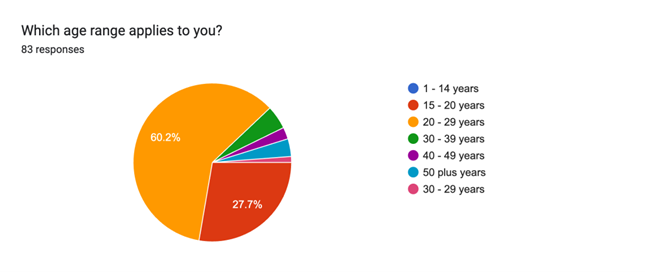
Graph showing age ranges of participants
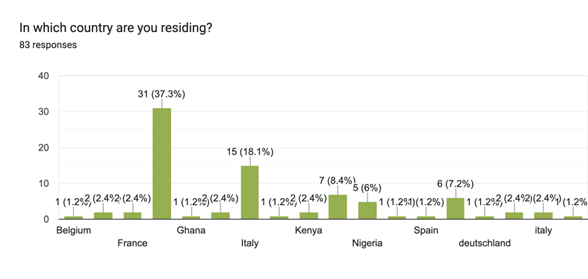
Graph showing residing countries of participants
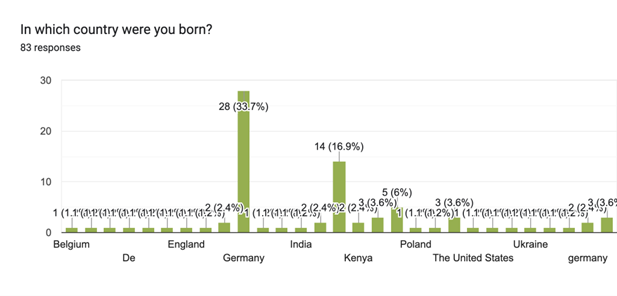
Graph showing countries of birth of participants
Timeline
The entire process of designing, launching, and analyzing the quiz was completed within a one-week period:
- First shared: March 21, 2025
- Closed: March 28, 2025
Through this initiative, we sought to gain valuable insights into public attitudes toward sustainability while fostering discussions on how individuals and communities can take meaningful action. In the following sections, we will delve into the quiz findings, analysis, and reflections on the results.
Quiz Findings and Analysis
Firstly we analysed answers about personal experience and interaction with the environment and a more conscious life. The first question was about the importance of a clean environment and from a scale of 1 to 5 we have not received any answer lower than three. Additionally, more than 65% chose the maximum answer.
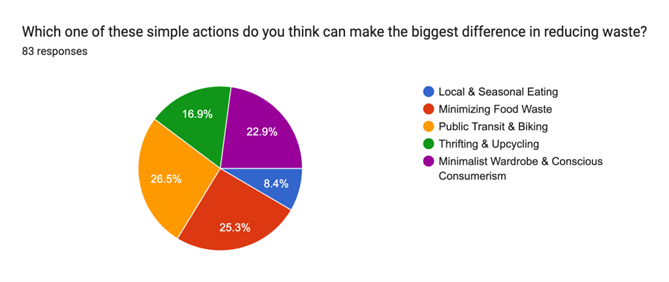
Graph showing participants opinion on actions making the biggest impact in waste reduction
We asked to share some reflections about which effective actions can be made and these were our answers (in the graph above). Then we supplied an image of the Agenda 2030 Sustainable Development Goals and asked which they considered the most important. Amongst them the most voted were goal n. 1 (no poverty), goal no. 13 (climate action), goal no. 4 (quality education), goal no. 2 (zero hunger) and goal n.3 (good health and well-being). The least mentioned goals were goal no. 7 (affordable and clean energy), goal n. 15 (life on land) and goal no. 17 (partnership for the goals). We could therefore say that people are especially concerned about quality-of-life problems and less on structural challenges.
In the following section, we asked about personal experiences and their approach to sustainability. The first questions were about how often and in what ways they repurposed household items. The average answer stated “quite often” and the main way they repurposed items was to reuse food jars and containers or shopping bags. A few participants also answered that they try to upcycle old clothes or use them as cleaning rags. Additionally, we asked which habits have been implemented to be more sustainable and the main answers were “using public transport or cycling” and “having a plant based diet”. The answers were all really uniform. Lastly, we asked if they had seen any commercials to reduce water or energy consumption recently and the majority of participants (73.5%) stated that they had not. Additionally, among the ones who answered yes nearly half or them responded that even if they saw any commercials, it didn’t have any effect on them.
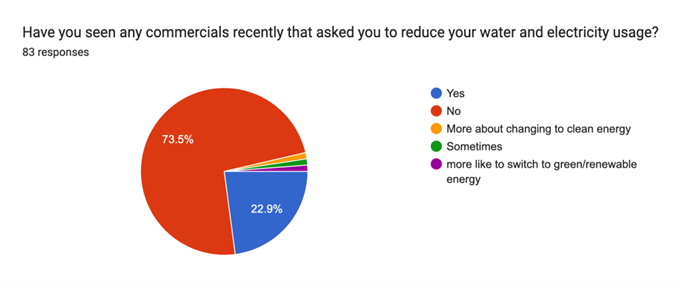
Graph showing whether participants had seen a commercial on water and electricity reduction
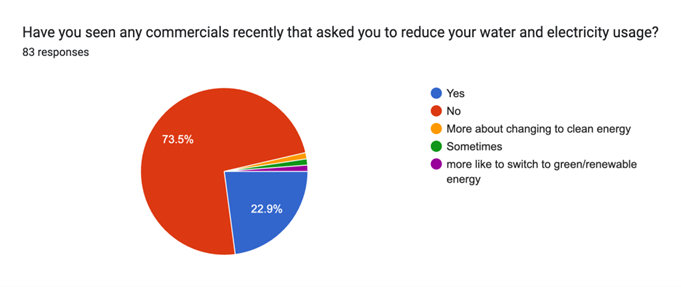
Graph showing whether the commercial had impacted the participants
Next, we analysed responses related to questions on awareness such as “Can you name sustainability-related issues that affect you and your local community”, and “Are you aware of any initiatives in your community that deal with sustainability”. When asked to identify different issues present in their local environment, 63.9% of respondents selected waste management and overconsumption as key issues in their communities, followed by air and water pollution (55.4%) and housing and urban development (55.4%). Overall, most people also chose climate change and extreme weather, social inequality and transportation challenges. Issues like food sustainability and security and lack of strong policy, instead, were selected by a lower number of respondents. Lastly, we can say that the biodiversity crisis and climate change adaptation are not considered a local sustainability issue for the vast majority of respondents.
The question “Would you agree with overconsumption being a problem in your community?” seems to reinforce the idea that overconsumption is believed to be a significant issue by most of our sample: 81.9% of respondents agreed, while 14.5% and 3.6% chose “No” and “Other” respectively. When asked to explain why, many said that overconsumption creates excessive waste, especially in terms of plastic, and that it leads to companies prioritizing their profits over reducing their impact on the environment.
Finally, 83.1% of our sample said they were aware of initiatives concerned with sustainability in their area, and many mentioned TooGoodToGo and thrift stores as examples of these initiatives.
Reflections
We started creating the quiz a week before it was released, therefore we had time to change questions, offer constructive criticism and alter it in a way that we thought would bring about a successful survey and quiz of sorts. Once shared, we sent it to people from around the world (as seen in the introduction). It was mainly shared digitally, which could be changed if this is recreated, and posters could be created and shared around the local communities, however since we were low on time, digitally was the fastest and most efficient way to share the quiz.
With regards to the findings, there were a variety of responses, especially with regards to the open questions, however overall, the responders gave detailed and showed understanding in what our goal was and answered honestly. Additionally, before beginning the quiz there is a “disclaimer” where we let the responder know that this was anonymously recorded and our purpose was to raise awareness and encourage reflection on sustainable practices, specifically within their local communities. The quiz revealed some encouraging trends, with many respondents expressing a strong commitment to sustainability, particularly in reducing waste and conserving energy. However, the findings also highlighted areas where further education and action are needed, such as reducing water and electricity consumption.
One key takeaway is that while awareness of environmental issues is high, practical implementation of sustainable practices could be improved. Many individuals indicated interest in adopting more sustainable habits but cited factors like cost and convenience as barriers. “I’d completely give up animal products if it weren’t so incredibly difficult and expensive.” This insight emphasizes the need for more accessible and affordable solutions to support sustainable living.
Overall, the quiz has provided valuable insights into public perceptions and behaviors toward sustainability, offering a foundation for targeted initiatives that can help bridge the gap between awareness and action.
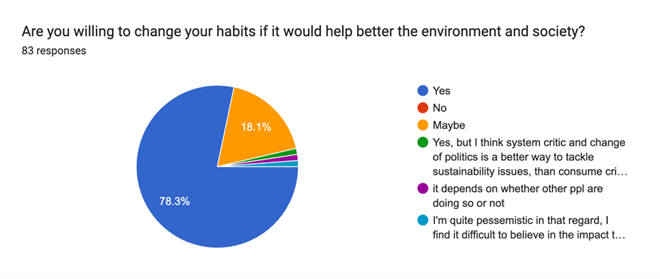
Graph showing the willingness of participants to change their habits
As seen in the graph above, many people are willing to swap their habits for more sustainable ones, with 78.3% agreeing. Taking a step further with the quiz insights, here are some more, hopefully, accessible habits and initiatives to implement. Depending on where in the world you are, some might me easier than others, however, at least one should be able to be implemented in some way:
- Reducing Single-Use Plastics: The convenience of single-use plastic products (bags, bottles, packaging) is a major contributor to environmental pollution. Proposed Change: Adopt reusable alternatives, such as metal or glass water bottles, cloth bags, and beeswax wraps, shop local at markets, buy with the intent to repurpose.
- Reducing Energy Consumption: Many people still engage in energy-wasting practices, such as leaving lights on unnecessarily, using inefficient appliances, or heating and cooling homes excessively. Proposed Change: Switch to energy-efficient appliances, use LED bulbs, and consider smart home systems that help reduce energy usage. Additionally, turning off appliances when not in use can make a difference. Education on energy-saving techniques also plays a crucial role.
- Supporting Sustainable Food Choices: Many people still consume large amounts of meat and processed foods, which have a significant environmental impact due to resource consumption and waste generation. Proposed Change: Incorporate more plant-based meals into your diet, reduce food waste by buying in moderation, and support locally grown, seasonal produce. Encourage local farmers’ markets, create more plant-based recipe resources, and offer subsidies for sustainably sourced foods to make it easier for people to make environmentally conscious choices.
- Conserving Water: Excessive water use in daily activities such as long showers, leaving taps running, or using water-heavy appliances is common. Proposed Change: Adopt water-saving habits like taking shorter showers, fixing leaks, using water-efficient appliances, and reducing water usage in landscaping.
- Switching to Sustainable Transportation: Encourage the use of public transport, carpooling, cycling, or walking when possible. Transitioning to electric vehicles (EVs) can also make a big difference. Suggestion for Change: Governments and communities can offer incentives like tax rebates, subsidies for EV purchases, or investing in better public transport infrastructure to make these alternatives more accessible.
- Supporting Green Businesses and Products: Many consumers buy products without considering their environmental impact, often choosing convenience over sustainability. Proposed Change: Opt for products from companies that prioritize sustainability, use eco-friendly materials, and engage in fair trade practices. This also encourages sustainable consumption actions with regards to shopping.
Conclusion
Even the smallest of actions can be the stepping stone towards real change. Our sustainability action task proves that, not only by the results, but through the action itself. As it has been highlighted throughout the exchange, we are all affected by the issues, and should unite to take collaborative action, even through singular choices. Small habits can amount to noticeable change, and our quiz allowed us to gather and verify knowledge on that.
Despite the relatively low number of answers and limited time resources, we believe in the success of the quiz, asserting that the sustainability quiz provided valuable insights into the perspectives of local, especially young, communities. Interesting were findings on the priorities of the Sustainable Development Goals indicated by the participants. While managing the project, our focus was on SDGs 11, 12, and 17 (respectively, Sustainable Cities and Communities, Responsible Consumption and Production, and Partnerships For the Goals), however, the data showcase divergence of publicly indicated importance towards elimination of poverty, education and climate action. Hopefully, our study will inspire larger-scale research focused on those topics, and education programmes on structural challenges which were deemed less relevant, such as clean energy and biodiversity.
The study of public attitudes, knowledge and behaviours, allowed us to conclude that there is general awareness, understanding of the importance, and knowledge on the topic, yet, the existence of practical barriers hinders possible action. The high costs, convenience, and even public or social perception between peers can influence the choices we make with regard to sustainable habits.
Forward looking, we hope our findings will inspire discussion and ignite spark for sustainably-aware actions. The challenges faced by the individuals require attention and action from communities, policy-makers, and judiciaries, in order to support and foster the implementation of previously acquired knowledge. Not a single person in our study, did not recognize the importance of a clean environment and surroundings, filling us with optimism and hopefulness for the coming generations. Be it repurposed jars, or reused plastic bags, every small action allows us to create a more equitable and brighter future.
